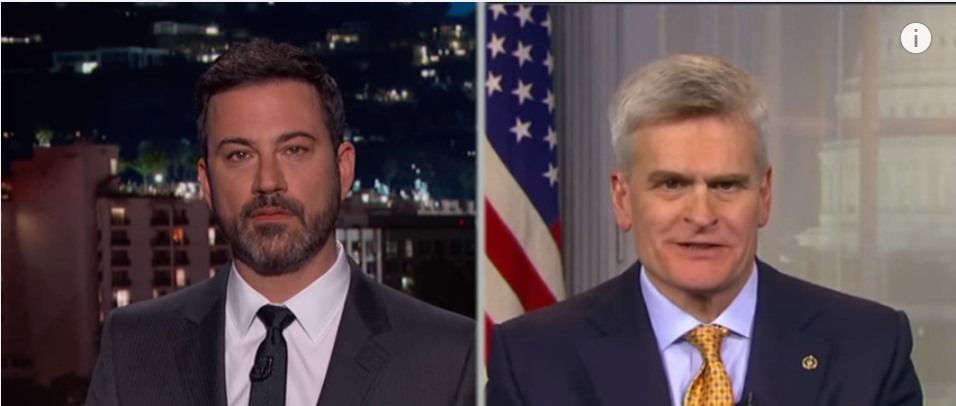
Some amazing things are taking place on late night television, and it’s not “Stupid Pet Tricks,” “Jay Walking,” or “Carnak The Magnificent.” These days, hosts from Jimmy Fallon to Seth Meyers to Stephen Colbert are all getting political – talking and joking about the “Breaking News” climate in which we now live. Every night, there’s prime material for these guys. And last evening was no exception with the abrupt firing of FBI Director James Comey.
While politics used to be a mostly taboo topic on these shows, Colbert has his mojo back, taking on the President, while forcing Fallon to recalibrate his humor, his approach, and his material. During this cycle, if you’re not talking politics on television, you may be leaving ratings on the table.
In recent days, it’s gotten a little testy and a lot interesting. Newly minted FCC Commissioner, Ajit Pai, has threatened to go after Colbert over a lewd Trump/Putin joke. And it makes you wonder whether Pai’s response is over indecent language, is it political, or is it a little of both? Colbert explained to his audience that while he has no regrets about knocking the president, he might have chosen his words differently.
That’s why the recent Jimmy Kimmel story is worth talking about. In case you missed it, Kimmel and his wife gave birth to a son with congenital heart disease. Shortly after the birth, it became evident to physicians the baby had a heart defect. The crisis that followed – consultations with doctors, a subsequent surgery, and the attendant grief – is a parent’s nightmare.
As Kimmel later said in his monologue, Billy’s surgery “was the longest three hours of my life.”
And for Kimmel, it was an awakening and a moment of truth. And it opened the door for him to talk about health care on a very personal level. From Obamacare to the newly passed House bill, Kimmel’s crisis gave him permission to talk about what health care means to the average American, as unlikely a person as he may be.
Moving from class clown to political activist, Kimmel has continued his sarcastic, self-deprecating humor. But now he talking about real life stuff – not just “Mean Tweets” – and the topic is reverberating in surprising ways.
 Republican Senator Bill Cassidy showed up on Monday’s show, talking about the need for his colleagues to craft a bill that passes the “Jimmy Kimmel test” – whether a child born with a condition like Billy’s can get health care during that first year of its young life. When they’re naming a litmus test for the health care bill after a late night TV host, that’s the definition of impact.
Republican Senator Bill Cassidy showed up on Monday’s show, talking about the need for his colleagues to craft a bill that passes the “Jimmy Kimmel test” – whether a child born with a condition like Billy’s can get health care during that first year of its young life. When they’re naming a litmus test for the health care bill after a late night TV host, that’s the definition of impact.
Kimmel’s comments on the topic have stirred controversy, and have roiled his audience – on both sides of the political spectrum. But because his conversation is based on a real-life, very personal, highly emotional moment in his life, it has taken on added resonance.
When it gets real, however, as it has with Kimmel, the equation changes. TV and radio personalities who have discussed highly personal challenges in their lives – cancer, substance abuse, marital breakups – have the ability to take it to another level. It is never easy to bare one’s soul on the airwaves, but in these moments, raw truth and authenticity make it more personal for audiences.
In Kimmel’s case, his difficult family circumstance has vaulted him beyond parodies, skits, and bits. He’s still doing funny stuff on the issue of health care, but the challenge with his son is on the mind of everyone watching his show. Not every on-air star faced with intense personal challenges is comfortable putting that on the air – and for good reason. It can be painful and difficult, and it shatters that wall between a media personality and the audience.
It can also change minds and alter lives. When a personality faced with a challenge like prostate cancer urges thousands of his male fans to get a PSA test, it has impact. In Kimmel’s case, his personal saga with his son raises an awareness for an issue that affects millions of Americans. These are the moments when a radio or TV star can connect with an audience in ways that cannot be bought, manufactured, packaged, or imaged.
That’s when it gets real.
- What Is It With Female Robot DJs? - April 30, 2025
- Why “Dance With Those Who Brung You” Should Be Radio’s Operating Philosophy In 2025 - April 29, 2025
- The Exponential Value of Nurturing Radio Superfans - April 28, 2025




Leave a Reply